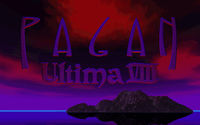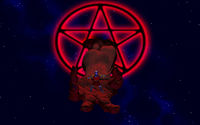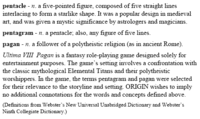Ultima VIII: Pagan
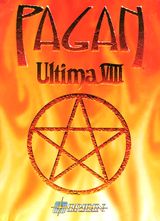
Ultima VIII: Pagan is the ninth installment of the main series and the thirteenth in the entire series (if the Worlds of Ultima series, as well as Ultima Underworld and Ultima Underworld II are counted). It was released and published by Origin for the IBM PC in 1994 and for the PC-9821 in 1995.
Gameplay[edit]
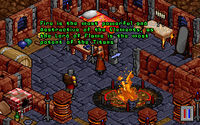
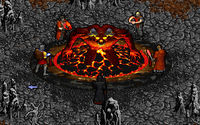
The game has some technical advantages over Ultima VII Part Two, and features full digital sound, detailed graphics and a simple physics engine. The Avatar, however, can only be male, travels alone without the benefit of party, and the game world is smaller than the settings in previous installments, with fewer characters and less dialogue. The game is also much more action-oriented than other Ultimas, and features numerous long dungeon sequences and jumping puzzles.
The narrative of the game is decidedly dark, and features the Avatar taking ethically questionable actions for the sake of returning to Britannia, in contrast to the Virtues valued in previous games. Many of the characters in the course of the story meet tragic ends and it is unclear as to whether the ultimate impact the player has on the world of Pagan is a positive one.
The Story[edit]
Spoiler warning: Plot and/or ending details follow.
The Avatar is abducted by the Guardian at the end of Ultima VII Part Two and brought to this world, Pagan. Vowing to destroy Britannia and Earth, he then drops the Avatar into the sea.
Pagan is an inhospitable world. The Guardian had mostly destroyed it many centuries ago with four of his underlings, the Elemental Titans. But the people have no idea that the Guardian is responsible together with the Titans and actually see them as saviors! The Avatar learns that the four Titans hold an iron grip over the world. In order to escape, the hero learns all the magic schools, after consulting the gods of old, gathers five special pieces of blackrock, and uses them to defeat the Titans and unlock enormous powers. Using the fragments, a Black Gate opens, allowing return to Britannia.
Upon arriving in Britannia however, it appears the Guardian has already conquered the land.
Spoilers end here.
Development[edit]
On its initial release, Ultima VIII: Pagan was exclusively produced for the IBM PC, and was subject to numerous plot and content cuts due to the strict deadline set for the project by Electronic Arts. Richard Garriott admitted that the game suffered due to the ensuing crunch, and claimed that the development team would have required another three months to finish it as it was originally intended. Despite its rushed production, Ultima VIII was the most successful game in the Ultima series in term of sales.
Differences Between Platforms[edit]
In 1995, Origin and Electronic Arts Victor (EAV) released a 3.5 disks and CD-ROM version for the PC-9821. This conversion is identical with the release for Japanese IBM PCs using DOS/V. Both the documentation and software was fully translated in Japanese and is missing the cloth map or trinkets.
Translations[edit]
- Main article: Translations of Ultima VIII
Ultima VIII was translated to several languages, including German, French and Spanish.
Release[edit]
The game originally was released on floppy disks. While it was never released, an enhanced CD-ROM edition was planned for the game, which was to provide, among other features, full recorded speech for every character.[1] The CD-ROM edition that was released was fully patched and included the speech pack.
Ultima VIII was later re-released in several budget editions as well as part of the Ultima Collection in 1998. All those editions have the documentations and maps on the CD only.
In Japan, the game was included in the compilation Ultima Complete.
Included with the game[edit]
The release of Ultima VIII included the following
- The book The Chronicle of Pagan
- A cloth map of Pagan in Ultima VIII
- A Pentagram Coin
- Playguide
- Install Guide
Music[edit]
The soundtrack for Ultima VIII was composed by Nenad Vugrinec (credited as Neno Vugrinec), a previous musical collaborator on Wing Commander II: Vengeance of the Kilrathi, Strike Commander, and Wing Commander: Privateer (the former two of which saw him working with Ultima VII and Ultima VII Part Two lead composer, Dana Glover). It is Vugrinec's only musical contribution to an Ultima title.
For the eighth chapter, the Roland MT-32 platform favored by Origin in previous years was retired and music was instead scored under the relatively new General MIDI standard, with MPU-401 compliant devices such as the Roland Sound Canvas series intended to be the ideal playback medium. With the introduction of recorded performances by a live orchestra in Ultima IX, it is the last Ultima to make use of the MIDI specification.
Underscoring the grim atmosphere pervading the game, Vugrinec's compositions for Pagan are a distinct stylistic departure for the series, abandoning minstrelsy and chamber music in favor of dissonant, minor-key arrangements for strings and choir, punctuated by a prevalent use of timpani and tubular bells. These characteristics lend much of the score an ominous and frequently eerie quality akin to what might be heard in a horror film, such as The Omen. In addition, certain parts of Vugrinec's work are reminiscent of French Romantic composer Camille Saint-Saëns' The Carnival of the Animals – specifically its seventh movement, “Aquarium”. With this more elaborate approach, individual pieces also often span up to several minutes, in contrast with the comparatively brief themes of previous installments.
As a reflection of the Avatar's isolation from Lord British's kingdom in the title's desolate, unfamiliar world, the soundtrack of Ultima VIII is the only in the series to omit "Rule Britannia," and the first in which "Stones" does not appear since its initial release in Ultima V.
A medley of select themes from the game appears on Origin Soundtrack Series Volume 3, while others were also later used in Ultima Online.
Expansions[edit]
Speech Pack[edit]
- Main article: Speech Pack
While Ultima VIII had initially been slated to include voice acting for the Titans, Zealan deities, and the Guardian, spoken dialogue was limited in the initial release of the game due to the size constraints of floppy disks. A speech pack was sold separately to reinstate the missing voices, although it performed below sales expectations. The CD-ROM version of Ultima VIII included the voice acting that the speech pack added, and had a list price of twenty dollars less than the basic floppy disk release.[2]
The Lost Vale[edit]
- Main article: Ultima VIII: The Lost Vale
It was planned that there would be an expansion for Ultima VIII known The Lost Vale, which would feature an adventure in which the Avatar discovered the last remnants of Zealan civilization on Pagan. However, Electronic Arts deemed the sales of Ultima VIII did not justify the release of the expansion, although the add-on was completed.
Fan Utilities[edit]
Ultima VIII cannot be run on a typical setup of a modern computer. Some fan-made upgrades try to address this problem.
Pentagram[edit]
Pentagram, a project still in development, is attempting to solve all the problems Ultima VIII has to be played on modern systems. This would make the game fully playable under various operating systems, namely MS-Windows, GNU/Linux and Mac OS X.
Ultima 8 for Windows[edit]
Ron Windeyer (aka Gaseous Dragon) has written a utility to run Ultima VIII on the MS-Windows operating systems. See his website for more information.
More Game Related Information[edit]
- For bugs in this game, see Ultima VIII bugs.
- For cheating in this game, see Cheating in Ultima VIII.
- For Easter eggs and real-life references in this game, see Ultima VIII Real-life references and Easter eggs.
- For a walkthrough, see Ultima VIII walkthrough.
- For technical details, see World model of Ultima VIII.
- For calendar information, see Pagan calendar.
- For detailed equipment information, see Weapon values and Armour values.
- For monster data, see Ultima VIII monster data.
- For a list of books and scrolls with their contents, see Ultima VIII books.
- For the location of all the key, see Key locations in Ultima VIII.
Trivia[edit]
- According to Richard Garriott, when interviewed by Caroline Spector for Ultima: The Avatar Adventures, Ultima VIII was originally slated to take place in Britannia.[3]
- Project director Mike McShaffry and programmer Jason Ely have since clarified that the game's ambiguous ending sequence had always been meant to depict the Avatar's arrival in a devastated Britannia. Having tired of Pagan, ongoing members of the Ultima team were eager to return the series to its traditional setting.[4][5]
- The pentagrams featured throughout Ultima VIII were deemed offensive by some consumers, prompting Origin to include a small explanatory write-up regarding the meaning of the symbol in the game's documentation. Still, in the later CD and budget editions, the pentagram was removed from the box cover altogether.
- Combat and death animations for all town NPCs were omitted from the game due to the limited capacity of floppy disks.[4]
- Ultima VIII was the last game to provide players with completion certificates. These certificates hinted that the Avatar did not return to Britannia at the game's conclusion, and its official clue book, Pentology, indicates that it was marginally intended for the hero to have stepped through the blackrock Obelisk into the homeworld of the Guardian.[6]
- Ultima VIII is the subject of a satirical book, Prince of Pagnasta, found in Strategic Simulations' 1994 CRPG, Dark Sun: Wake of the Ravager. Penned by Trogari (a near-anagram of Garriott), the book's protagonist, Tavara (similarly, an anagram of Avatar), alludes to Pagan via thinly-veiled mockeries of the game's perceived shortcomings, including its briefness, action-oriented focus, and the conspicuous absence of the Birthplace of Moriens, which infamously failed to appear in initial releases despite the player being directed to locate it.[7]
- The Avatar as seen in Ultima VIII appears with a near-identical character model in the final level of Bullfrog Productions' 1997 strategy game Dungeon Keeper, and is the most formidable adversary found in the title.
- The lo-res version of the original box art was made available by Denis Loubet and is shown in the gallery below. As Loubet recounts, he basically created the flames by distorting a color gradient before placing the other elements above it and then upscaling the picture significantly so that he would not repeat the same mistake as with the cover art of Ultima Underworld II, which was visibly pixelated.
Gallery[edit]
Game box art PC-9821 floppy version
External Links[edit]
- Ultima 8 for Windows
- Ultima VIII Pagan – various downloads, including patches and manuals
- Pentagram website
- Ultima VIII: Pagan on Notable Ultima
- Ultima VIII nitpicks
- The Other Codex – Ultima VIII
- Ultima VIII on Ultima Aiera
- The Complete Guide to Ultima VIII: Pagan
- Ultima VIII: Pagan on Wikipedia
References[edit]
- ↑ “The GAMERS' Forum's Ultima VIII: Pagan Conference”. April 27, 1994. Retrieved 2012-04-28.
- ↑ New Releases Catalog. Origin Systems, Inc.: 1994.
- ↑ DeMaria, Rusel et al. "A Conversation With Richard Garriott". Ultima: The Avatar Adventures. Prima Publishing: 1992. Page 364.
- ↑ 4.0 4.1 Kully, Kenneth. ““We had a lot of fun with the other explosives…” – An Interview with Jason Ely”. The Ultima Codex. 2014-03-18. Retrieved 2014-09-25.
- ↑ Kully, Kenneth. ““Oh no, not Moonglow again!” – An Interview with Mike McShaffry”. The Ultima Codex. 2014-04-11. Retrieved 2014-09-25.
- ↑ Mead, Melissa. "Endgame". Pentology (Ultima VIII). Origin Systems, Inc: 1994. Page 92.
- ↑ GameHorder. “Let's Play – Dark Sun: Wake of the Ravager – 24”. YouTube. 2013-08-16. Retrieved 2014-09-25.
